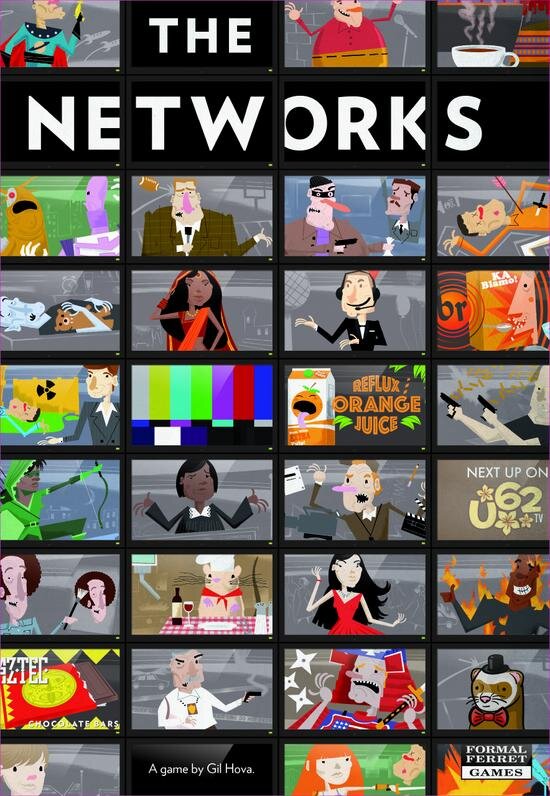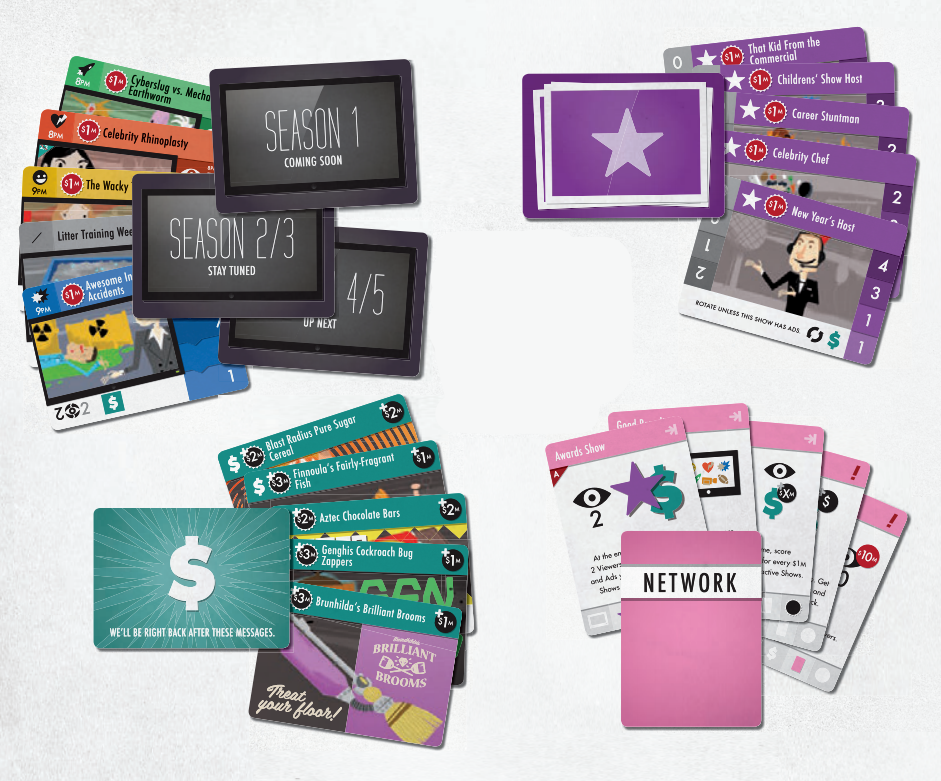The Networks – First Impressions
Review copy provided by the publisher
What if you could be the TV executive who introduced the world to the next Lost? Or maybe Game of Thrones? Well, you’re probably not going to achieve that, but maybe you can convince some people to watch the Wide World of Forks? That’s more in your wheelhouse, right? You’ll just have to make sure that no one else in the business is getting into the scintillating world of TV cutlery.
In The Networks from designer Gil Hova, you are the owner of a new television network and you’ve got to clear the slate of terrible public access shows that plague the screens of your viewers and replace the whole lineup with some primetime shows that will make their eyeballs pop. Figuratively. You really don’t want a literal mess like that because you can’t afford to lose any viewers.
You aren’t the only aspiring TV bigwig in the house, though. Others are clamoring for the visual fealty of the drones in front of the silver screens. In order to beat out the competition, you’ll have to secure the best shows, land the biggest stars, and score some truly profitable advertisement agreements.
If you can handle all of that pressure, maybe you’ll come out on top at the best TV station in the business, proven by the presence of untold viewers.
What It Does
Photo credits: Formal Ferret Games
As competing television networks, players will need to be savvy in The Networks. Programming is king, ad revenue is queen, and all of the bratty stars that you’ll have to persuade to work on your shows are the princes and princesses who will woo your audience. And that’s the magic formula—Shows, Stars, and Ads.
Shows will get you the viewers, obviously, but the Stars will bring it up into the next weight class and the Ads will keep you from running too deeply into the red. Keep the money flowing and the stars happy. Whatever you can’t secure with money and famous actresses will have to be gained through the strategical use of Network cards. Those are the heavy-hitting bonus actions and powers that will help you gain an edge over the competition. Whatever’s out on the board, though, is fair game, so make sure you Develop Shows, Sign Stars, and Land Ads before someone else can.
Stars and advertising companies can be finicky, though, so you might have to bend over backward to accommodate the weird conditions they demand. If you can do that effectively, however, you’ll definitely extract the most value out of the deal.
In the world of showbiz, unfortunately, the “cult of the new” is very apparent, so shows will likely fall off in viewership as they age. With only five seasons to play, the TV talking heads around the table will need to determine when to keep a show on-air and when to yank it off and send it re-running the other direction in order for a new show to take its place in primetime. Maybe bring in another show of the same genre to try and unlock some bonuses?
After five seasons of television drama, the player with the most viewers will win the game.
How It Does It
The game is split between five seasons. Players will score Viewers from their shows at the end of each season and at the very end of the game, the active lineup (not reruns) will score one final time.
During each season, there will be Shows, Stars, Ads, and Network cards all available for players to select. Here’s what you can do in a turn:
Develop a Show
Sign a Star
Land an Ad
Take a Network card
Attach a Star or an Ad
Drop and Budget
You can only do one each turn. So if you really need that show, you should probably develop it before someone else snatches it. But it might have some prerequisites you’ve got to accommodate for. So maybe you’ll have to hope it’s still there on your next turn after you’ve done the due diligence and signed the right star or landed the right ad.
It’s all about making the best possible choice on your turn from the options that are still available out on the table. Sometimes, it’s best to forego that genre bonus or wait until later for that Network card double action because the cards available aren’t worth it, or the shows that are still there clash with good ones you’ve already got slotted into certain timeslots.
Players will have to manage income and be judicious in their drafting in order to maximize the set collection of shows in their lineup, reruns, and archives. It’s all about the viewers so that may mean slashing shows after one season and starting fresh, or it could mean holding onto a show until you squeeze the maximum value out of it.
Whatever you decide, make sure it’s taking into consideration the hyper-parodic but perfectly relatable eyeball Viewers. That’s the endgame goal. That’s the point of playing The Networks.
Why You Might Like It
There are a lot of laughs inside of The Networks because it skewers and displays some of the most absurd elements of television shows. There are so many amusing parodies of shows that players are familiar with and it plays on the tropes that exist in the entertainment world.
The Networks has a lot of content in the base box, with Network cards that build interaction and complex action-resolution, as well as more cards than you’ll use in a game. For the adventurous, even more content exists in expansions to really elevate the game to another level of depth and opportunity.
Why You Might Not
The component quality can sometimes feel like it’s from another age of board games. Flat-colored pictures on white cardboard don’t pop off the table quite like the colorful, vibrant, plastic miniature-filled worlds that are being offered up thanks to crowd-funding platforms like Kickstarter or Gamefound.
Once you’ve played the game enough, you’ll be familiar with all of the jokes from the shows, so some of the humor won’t be as powerful in successive plays. Expansion content will certainly stave off that feeling, but it lurks in the background all the same.
Final Thoughts
Check out the game in action with Becca Scott from Geek & Sundry!
You may be wondering why I’m talking about a 2016 board game release five years into the future. Well, I just recently played and reviewed The Rival Networks, which takes the TV madness of this 2016 game and reimagines it as a two-player game.
So naturally, I decided to take a look at this game as well, since it’s the inspiration for the new release. I like to know the context behind why certain games exist and how they improve upon or change up the mechanics of what came before.
And I realized when playing The Rival Networks that I had actually played The Networks right around when it was originally released. I had just forgotten about the experience because it had been very, very late at night and my brain was mush by that point. So there was additional incentive to return to this game and see what it was now that I’ve been in the hobby for a number of years and my tastes and experiences have evolved.
To that end, I do think that The Networks is a solid game. I think it will be even better once I incorporate the elements of The Executives expansion, but it’s a solid start. I enjoyed the two-player adaptation of this game, but it left me wondering at the end whether it had staying power in a collection since all of the cards were seen every game. I thought it would probably lose some of its luster and become less memorable after revisiting it. I don’t fear the same thing with The Networks. There are enough cards and possibilities to keep players engaged for much longer. More cards, more abilities, and more ways to influence how the game goes down.
Part of that must be attributed to the length of the game as the five-season scope allows for players to invest in shows and get more out of their decisions. And the other part is the size and ambition of the game. The Rival Networks naturally loses complexity and depth given its smaller size and the intent to provide a tight, two-player experience. The Networks, on the other hand, already assumes that two-player games will take place but opens to arms to a broader player count while still retaining its charm and strategy.
Maybe the only downside of the game would be the physical production quality, which doesn’t quite leave you in awe as do many games that release nowadays. There is some charm and quirkiness to that element of the game, but it may look a little sad on the shelf next to your two-foot-deep chest of Descent or your deluxified box of Tidal Blades.
That’s not a big detractor for me at the end of the day, though.
The Networks captures the silliness of the TV world while also forcing players to think about what they want to do with the Shows, Stars, and Ads that they drag onto their network. It’s better than The Rival Networks, but it’s got longer legs to stand on.
Funny, goofy legs that will keep players coming back for more. Even five years down the road.
If you want to check out The Networks, you can visit Formal Ferret Games or read what the community thinks on BoardGameGeek.
The Networks brings the humor and larger-than-life world of television to the table. From the silver screen to the wood(?) table, it’s all about getting those viewers. The bigger the show, the more famous the stars, the spendier the ads, the better.
Let us know in the comments and give a recommendation for other games of which to share our first impressions.




